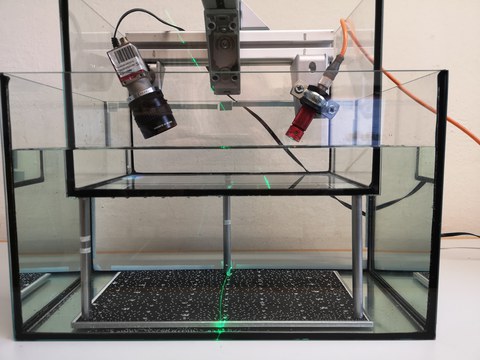Strict geometric modelling concepts for underwater laser triangulation
Project title
Strict geometric modelling concepts for underwater laser triangulation
Funding / Duration
German Research Foundation (DFG) / 2 years (Start: 01/2020)
Description
Laser triangulation, based on a laser lightsheet illuminating a profile of an object surface imaged by a camera under a parallax, is one of the most common optical 3D measurement techniques. The technique is also very relevant as a 3D sensor on upcoming UWVs (unmanned water vehicles) for precise underwater measurements of riverbed topography in small rivers for environmental monitoring tasks, as well as for other underwater measurement tasks. Applying laser triangulation techniques for 3D point coordinate determination underwater requires several modifications of the geometric and stochastic models for sensor modelling and calibration. The laser light rays are refracted twice on their way from air to glass and from glass to water.
Therefor the goal of this project is to develop a strict geometric model for underwater laser triangulation and to validate it with the focus on UWV applications in the field of environmental monitoring.
Unlike lidar bathymetry instruments usually flown on an aircraft, laser triangulation systems can be designed as very compact lowcost devices, which can easily be mounted on a small UWV platform. It also has a much higher precision and spatial resolution potential than echo sounding techniques or airborne laser bathymetry. Compared to this, its disadvantages of limited spatial coverage and depth range are less relevant in typical UWV applications, which are for instance in the provision of riverbed data as a basis for flood simulations in small catchments, in ecosystem monitoring, underwater habitat mapping or in sedimentation processes monitoring. Beyond this, underwater laser triangulation also depicts an interesting 3D measurement tool on autonomous submarine vehicles for technical purposes such as pipeline welding, or for underwater archaeology.

Underwater Laser Triangulation System

Ray paths of laser and camera

UWV as sensor platform
Relevant publications
Contact
- M.Sc. Hannes Sardemann (Project staff)
- Prof. Dr. habil. Hans-Gerd Maas (Project manager)
